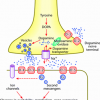Recently i've found that Inositol may be 'able to reverse desensitization of serotonin receptors', ( http://www.ncbi.nlm..../pubmed/9169302)
I am currently on citalopram (an SSRI) for anxiety,
and came to think about if Inositol may have restorative properties at the serotonin 5HT1A autoreceptor and 5HT2C receptor (those two are what i worry about the most),
i mean; if Inositol does in fact reverse densensitization on those receptor types, that would pretty much reverse a good deal of the SSRI anti-depressive properties..
So as my question is; Does Inositol reverse desensitization of the 5HT1A autoreceptor and the 5HT2C receptor? (and would it reverse SSRI-induced changes to them?)


















































